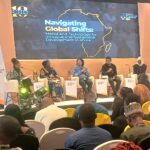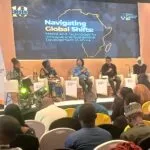
The Lake Chad region has endured years of insurgency, leaving devastation and displacement in its wake. On Tuesday, Nov. 26, Hauwa Shaffii Nuhu, the Managing Editor of HumAngle Media, joined other experts to explore solutions to the protracted crisis plaguing the region.
The panel discussion titled: “Countering Insurgency in the Lake Chad Basin: Policy Solutions for Regional Stability” is part of the Media Development Conference organised by the Centre for Journalism Innovation Development, ongoing in Abuja, north-central Nigeria.
Moderated by Amaka Okoye of DW News, the session also featured Ndubuisi Nwokolo, a Peace and Security Partner of Nextier; Chris Ngwodo, Director General of the Office for Strategic Preparedness & Resilience; Paul-Joel Kamtchang, the Executive Secretary, ADISI-Cameroon; and Saratu Joshua Pindar of the Centre for Civilians in Conflict.
Hauwa emphasised the need to speak directly with victims affected by the insurgency to understand the root causes of insecurity in Lake Chad rather than merely treating its symptoms.
“The simplest way to report ethically and get solutions is to focus on victims of insurgency,” she said. “At HumAngle, we look beyond the numbers known to the public. We try to focus on victims and reach out to families of people affected. When these are done, questions will arise, and there will be accountability.”
“People have the right to know, and victims must be asked important questions about what affects their lives. While we continue to do reports about these persons, we should feature the role of the perpetrators and institutional failures. So, we need to document the human cost of conflict and help us understand the extent of the problem we have and how to tackle them.”
Other panellists highlighted the importance of economic empowerment and development in the region. On his part, Chris Ngwodo said the lack of economic opportunities has created room for extremist groups to recruit.
“It’s not possible to achieve sustainable peace without talking about economic stability,” he said. “Insurgency does not end all of a sudden; it takes processes. We are dealing with [issues like] significant land mass; [these are] practical problems. Things that trigger insurgency did not happen overnight and should be addressed.”
Paul-Joel called for greater media engagement to bring attention to the plight of communities in the Lake Chad region. “It is important to see more media organisations and journalists go to affected communities and tell the public what is happening to Nigerians in forgotten areas. We need to access places and convince victims to speak about their predicament. Then, we can talk about solutions,” he added.
Additionally, Ndubuisi urged the government to re-introduce the people to their communities and called for strategic planning within the security sector.
The panel also addressed the role of security agencies in mitigating the crisis. Saratu Joshua encouraged the military to adopt human rights frameworks, particularly in dense conflict zones. “For instance, they must distinguish between military objectives and civilian safety. It helps them understand the use of proportional methods,” she noted. “Wars are fought in densely populated areas, and they should understand the extent of damage that may be done when trying to curb insurgence.”
Hauwa concluded the discussion by underscoring the media’s role in ensuring that victims of violence are prioritised. “We must not platform terrorists,” she said. Instead, she emphasised the need to give victims the coverage they deserve, amplify their voices, and hold institutions accountable.
Hauwa Shaffii Nuhu, Managing Editor of HumAngle, participated in a panel at the 2024 Media Development Conference addressing solutions to the Lake Chad insurgency crisis.
During the discussion, she highlighted the importance of engaging directly with victims to understand and address root causes, as well as the necessity to document the human cost of conflict.
Other panelists, including Chris Ngwodo, emphasized economic empowerment’s role in countering extremism, while Paul-Joel Kamtchang advocated for increased media presence in affected areas. Additionally, Ndubuisi Nwokolo called for strategic security planning and community reintegration, and Saratu Joshua stressed the significance of military adoption of human rights frameworks in conflict zones.
The discussion concluded with a call to focus on victim narratives over sensationalism to foster accountability and understanding.
